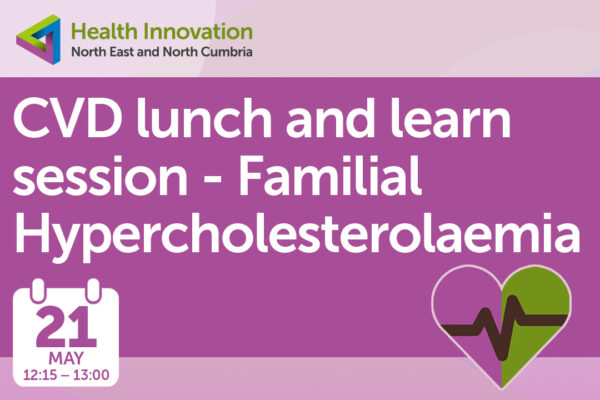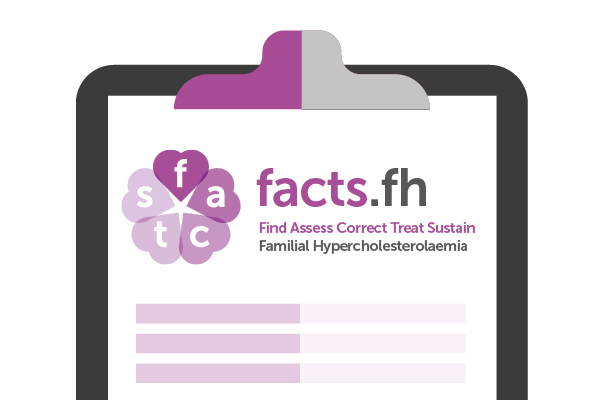Familial Hypercholesterolaemia
The HI NENC Cardiovascular Disease Prevention Programme includes Familial Hypercholesterolaemia (FH), identifying people with this genetic condition and optimising their treatment to give patients the best chance of avoiding cardiac events.
HI NENC will support GP practices across the region to search their patient records for historic blood lipid levels to identify those at risk of FH. Relevant patients will be referred for genetic testing, after genetic counselling, to confirm or refute the diagnosis of FH and subsequent treatment administered to reduce the risk of possible cardiac events.
We have developed a Standard Operating Procedure (SOP) and a Handbook for use by primary care staff. These have been developed collaboratively with clinicians and the CDRC team.
There are regional Northern England Evaluation and Lipid Intensification (NEELI) Guidelines which include information across the whole of the lipid pathway, including FH, and we would encourage these to be followed. View the guidelines here.
Using CDRC Precision
Using the searches provided by CDRC it is possible to identify potential patients with possible FH at GP practices.
CDRC digital resources are designed and developed in the North East and North Cumbria by local clinicians. Their work is supported by NHS England, North of England Commissioning Support (NECS) and HI NENC.
All CDRC resources are available at no cost to Primary Care users and can be accessed via SystmOne or EMIS. For information on how to access the resources from your preferred clinical system, please visit the CDRC webpage for EMIS here or the SystmOne resources page here.
FH course at Northumbria University
If a patient is diagnosed as having FH, there is an opportunity for the specialist nurses at the Northern Genetics Service to then cascade the test which means that their families can be genetically screened to determine if they also have FH.
HI NENC, in conjunction with Northumbria University, have developed a training programme to upskill healthcare professionals with the knowledge and competencies to provide a primary care based, genetic testing and counselling service for patients with suspected FH. After completing 30 hours of study, learners should be able to achieve the following learning outcomes:
- Demonstrates up to date knowledge of the condition and the impact this has on the patient and a family living with FH.
- Able to identify individuals and families who have or are at risk of FH.
- Convey to the patient the purpose and the process of the genetic test being offered using understandable and non-directive language.
- Understand the legal, ethical and social considerations which underpin genetic testing for this condition.
- Recognises professional responsibilities and seeks advice appropriately when needed.
The course has three cohort intakes a year. Find out more about the course here.
Familial Hypercholesterolaemia (FH) Programme – Pilot Project
The FH element of the CVD Prevention Programme was originally a pilot project focusing on a number of GP practices in Newcastle, County Durham and Darlington, and was a collaboration between CCGs, GP practices, AMGEN, SANOFI, the Northern Genetics Service at the Newcastle Upon Tyne Hospitals NHS Foundation Trust, the lipid service at South Tyneside and Sunderland NHS Foundation Trust, Newcastle University and HI NENC. This work was so successful that it became a national programme (2020 – 2023). Please see separate webpage which detail more about this pilot.
Partnership working
Genomic Medicine Service Alliance
HI NENC works closely with our regional Genomic Medicine Service Alliance (GMSA) who are currently piloting work to examine strategies to increase identification of patients with FH in primary care. We share resources, knowledge and experience. To find out more about their work please visit their website.
GENinCode
We’ve been working in collaboration with GENinCode, the predictive genetics company focused on the prevention of cardiovascular disease, to pilot and implement the use of its Lipid inCode® test for the diagnosis of hypercholesterolemia (high levels of cholesterol) and familial hypercholesterolemia.
Lipid inCode® is the first commercial polygenic test for CVD to be implemented by the NHS. Read about how HI NENC will now implement the use of the test in the Darlington PCN and community practice representing over 100,000 patients in the North of England.
What is FH?
Most people have heard of cholesterol, but some people can have high cholesterol through a faulty gene in their bodies which can be passed onto their children. This genetic condition is called familial hypercholesterolaemia or FH. The aim of this short, two-minute video is to demystify genetics for patients, and to encourage those diagnosed with FH to talk to other family members, encouraging them to get tested. The video was produced in collaboration between HEART UK, and two of their patient ambassadors with the Northern Genetics Service and HI NENC.
Family Videos – Heart UK
A suite of short films featuring families that are living with Familial Hypercholesterolaemia (FH) have been developed to raise awareness of the condition.
The three films, funded by Northern England Clinical Networks and supported by Heart UK, offer an insight into what FH is and what it’s like to live with from the perspective of the Middleton and Ryder families.
We’d like to acknowledge the work by Susan Musson, FH Nurse Specialist, Northern Genetics Service at Newcastle Upon Tyne Hospitals NHS FT and Dr Neil Hopper, Consultant Paediatrician, South Tyneside and Sunderland NHS FT.
The films are available to watch below and further information can be found on Heart UK’s website at https://www.heartuk.org.uk/cholesterol/being-a-parent
What is FH?
Healthy Living with FH
Living Life to the Max
Living with FH – Leanne’s story
Leanne has been diagnosed with Familial Hypercholesterolaemia which has also led to several of her family members being diagnosed with FH. Hear her story and how she manages her genetic condition.
Familial Hypercholesterolaemia
Familial Hypercholesterolaemia (FH) is a condition that affects around 150,000 people in England. It is passed on genetically and can cause early heart attacks and death. Once identified it is controlled by treating high levels of cholesterol in a patient’s blood.
FH is an inherited condition which leads to exceptionally high cholesterol levels, often 2 – 4 times those of the general population.
There are two types of FH:
Heterozygous FH (HeFH): This is where the individual inherits a faulty gene from only one parent.
Homozygous FH (HoFH): This is where the individual inherits the same faulty gene from both parents. Individuals suffering from this type of FH tend to have very high cholesterol levels, in the region of 10 – 20mmol/l (or higher) and are at very high risk of suffering a cardiovascular event. However, the numbers affected with this type of FH are very small, in the region of 60 nationally (one in a million).
Overall, it is estimated that one in 270 people may have FH in the UK but less than 10% of these people have been diagnosed. This means just over 240,000 people may be living with this condition, and it is estimated over 51,000 children in the UK have FH; only 600 of these are known.
FH is passed from generation to generation through a ‘faulty’ or ‘altered’ gene. This means that brothers and sisters or children of someone with FH have a 50% chance of having the condition. If left untreated it can lead to early heart disease, but early diagnosis and effective treatment reduces the risk of heart disease and can help ensure that people with FH have a normal life expectancy.
Why identify FH patients?
- The NICE FH Guideline (CG71) recommends genetic testing of relatives of individuals known to have FH. This is the most effective strategy for early identification, leading to effective treatment through diet, lifestyle interventions and cholesterol-lowering drugs.
- NHS LTP has a target of identifying 25% of people with FH by 2025.
- The Primary Care Network (PCN) DES contract 2022/23 includes referral for assessment of FH.
- Without treatment, men with HeFH can develop symptoms of coronary heart disease before 40 years, and half will be symptomatic by the age of 50 years. In women, a similar proportion are symptomatic by 60 years of age.
- With early intervention and careful follow up to ensure concordance with treatment, the excess coronary heart disease risk and premature mortality associated with FH can be effectively reduced.
CVD Lunch and Learn: The importance and understanding of Familial Hypercholesterolaemia (FH)

CVD Lunch and Learn: The importance and understanding of Familial Hypercholesterolaemia (FH )for patients and families.
Child-Parent Screening

The Child-Parent Screening Programme is a part of a national cardiovascular disease prevention programme and aims to identify families with Familial Hypercholesterolaemia (FH) supporting the NHS Long Term Plan ambition to reduce Cardiovascular disease. As part of the Child-Parent Screening…
Familial Hypercholesterolaemia Pilot Project

Familial Hypercholesterolaemia (FH) is part of the AHSN NENC Cardiovascular Disease (CVD) Prevention Programme and was originally piloted in the North East and North Cumbria by the AHSN NENC. This successful pilot project identified an opportunity to improve FH diagnostic…
Regional Familial Hypercholesterolaemia (FH) Service

The North East and North Cumbria (FH) Service is committed to ensuring all patients with FH receive the best care. The AHSN work closely with the service as part of the FH and lipid optimising national programme. The FH service…

